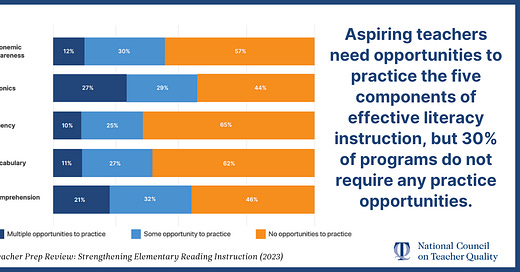Welcome back to the Education Policy Hotlist!
Most days, I am a generalist in education policy unless it is a day when I can talk about accountability or reading education. With that in mind, I am thrilled to share the latest National Council on Teacher Quality (NCTQ) report: A Teacher Prep Review: Strengthening Elementary Reading Instruction. The report sheds light on how we can improve reading instruction for our elementary students by addressing missteps in teacher preparation programs.
Reading is crucial for students to access content in all educational settings and day-to-day life experiences. However, reading has become a social justice issue due to longstanding misconceptions about how children learn to read and stubborn barriers to reforming statewide policies and instructional practices.
National data documenting that one-third of fourth graders cannot read at a basic level provides an impetus for change agents to look upstream along the instructional pipeline. In this report, NCTQ explores how teachers are taught to teach students to read.
The NCTQ report reveals a serious issue with how we prepare our future teachers to teach reading. The study analyzed nearly 700 teacher preparation programs nationwide and evaluated how well they cover the core components of scientifically based reading instruction: phonemic awareness, phonics, fluency, vocabulary, and comprehension.
More than 50 years of research have shown that students need these essential skills to become proficient readers. However, teacher preparation programs have significant gaps in reading education for future elementary teachers.
This report resonated with me deeply because of my journey with reading education. After becoming a third-grade teacher, I enrolled in a master’s program to prepare me to become a reading specialist. I was eager to learn and apply evidence-based practices in literacy instruction and support our students’ long-term successes. However, after years of teaching in early grades and seeing little improvement in my students’ scores — even across states — I was confused and deflated.
It wasn’t until I returned to the classroom on a whim to fill a vacant reading specialist role at a K-8 school that I saw the transformative power of direct, brain-based reading instruction. The person I was stepping in for walked me through their curriculum and how to implement the lessons across the age bands I worked with.
Fast forward a few months; it was the end of the school year, and I was blown away. Our students were nearly at grade level for the start of their next academic year. During those few months, I realized I was never taught how to teach students to read.
As a mom of a struggling reader who sits on the other side of the kidney-bean-shaped table at IEP meetings, I am an uncompromising advocate for data-driven, direct, science-based reading instruction.
This report is a transformative tool for state policymakers across the country. It focuses upstream by pointing to improvements that teacher preparation programs can make to ensure all U.S. students achieve reading proficiency in early grades. This report can empower educators as advocates — please join me in taking action by reading the report and sharing this new data with your state and local leaders.
THE WEEKS AHEAD
On Thursday, June 15th, 2023, at 9:00 a.m. (PST), join Edunomics Lab for a webinar about district staffing. Register here.
On Thursday, June 22, 2023, at 1:00 p.m. (EST), Fordham is hosting a webinar to discuss a newly released report Building a Wider, More Diverse Pipeline of Advanced Learners. Register here.
On Friday, June 23, 2023, at 1:00 p.m. (EST), the Overdeck Family Foundation is hosting a webinar about How Family Engagement Supports Kindergarten Readiness & Early School Success. Register here.
FEDERAL EDUCATION POLICY
The U.S. Department of Education announced new funding opportunities to support teacher career advancement, including the Teacher and School Leader Incentive Program — a discretionary grant program to develop and improve performance-based compensation or human capital management systems. Submissions are due by June 28, 2023 [ED].
The Federal Trade Commission obtained a $6 million order against Edmodo for violations of the Children’s Online Privacy Protection Act Rule that requires operators of online services to obtain parental consent before collecting and storing personal information from children under age 13 [Whiteboard Advisors].
IES released new funding opportunities for FY 2024 to support longitudinal data support, state policymaking, and transformative research in schools [IES].
The debt ceiling bill leaves federal education funding flat [K12 Dive].
ASSESSMENT AND ACCOUNTABILITY
As required by the state legislature, Indiana developed and continues to improve their it’s statewide student and school dashboard [K12 Dive].
Louisiana released a new dashboard to provide community members an easier way to view progress on important K-12 indicators [LA].
What would happen to performance assessments' design, implementation, and scoring if they were used for federal accountability? Read more about why this is an issue and potential solutions for the performance-based assessment advocates [The Center for Assessment].
Dale Chu interviews New Meridian’s Arthur VanderVeen to investigate their efforts to develop large-scale assessments useful for instruction and accountability [AssessmentHQ].
EDUCATION FINANCE
Chad Aldemen pens a series of guest posts at Bellwether on the state of teacher pensions and how pensions may put additional strain on school budgets [Bellwether].
A Delaware consortium approves a new spending plan, including a new equity-based data dashboard to evaluate and report on the progress of improving racial equity [DE].
Education finance experts recommend that teachers hold onto their jobs because the odds of finding a new position in the next few years will be slim [The74].
An education funding commission in Pennsylvania is considering how to right-size their funding system for schools, which was deemed unconstitutional in February [PA].
TEACHING AND LEARNING
Long live teaching and learning [Citizen Stewart].
School leaders believe teachers need better preparation to handle student behavior needs [Brookings].
STUDENT NEEDS AND OUTCOMES
A new study finds that when schools provide parents only student growth information—alone and not in concert with academic proficiency by status — it improves desegregation [AERA].
A new study focused on charter school performance in 29 states, Washington D.C., and New York City finds that charter school students gained more academic growth than their traditional public school peers [The74].
A new study finds that the Detroit school district under-identified students experiencing homelessness and housing instability [PEER].
STATE EDUCATION POLICY
New Mexico is leveraging a federal push to improve access to Medicaid-covered services in school-based health centers [NM].
A new Texas bill develops incentives for multi-district Rural Pathway Excellence Partnerships (R-PEP) — where districts with fewer than 1,600 students join with higher education and industry partners to expand access to pathways leading to high-wage, high-demand careers [TX].
LITERACY
According to ECS, nearly 90 new bills were introduced in states this legislative session regarding reading instruction and early literacy — learn more about early literacy policies across the U.S. in their newly updated 50-state review [ECS].
Being awarded a high school diploma while lacking grade-level reading skills is not new in California’s juvenile justice system [EdSource].
POSTSECONDARY SUCCESS
Jobs for the Future announces a new North Star goal and five areas of focus, including (a) creating learner and worker opportunities, (b) strengthening education and career navigation, ensuring program quality and efficacy, (c) ensuring program quality and efficacy, (d) integrating learning and work, and (e) building strong regional economies [JFF].
ICYMI
The Hunt Institute announced that former United States Secretary of Education Arne Duncan and New Mexico Governor Susana Martinez were elected as the new Board Chair and Vice Chair, respectively [Hunt].
Dr. Christine M. T. Pitts serves as Senior Policy Fellow at the Center on Reinventing Public Education, leading policy and external affairs. With a teacher and researcher background, Christine previously led research and evaluation for Portland Public Schools. She served as Policy Advisor at NWEA, overseeing state and federal policy to advance equity and innovation in educational assessment. Follow her on LinkedIn, Instagram, and Twitter for updates.









